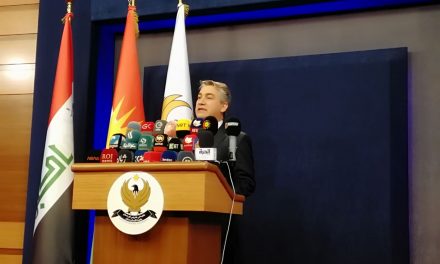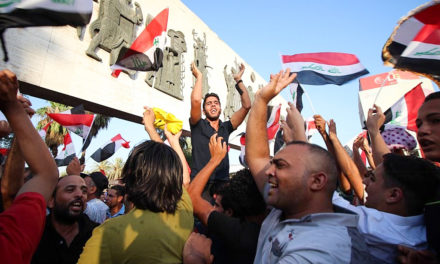July 10, 2018 marked a year of Mosul being free from the oppressive rule of Da’ish, three years and one month after the city had fallen to terrorists. While they were three long and difficult years on the innocent citizens of Mosul, to the surprise of many security and political experts, Mosul’s liberation came much quicker than expected. This is a testament to the resilience and determination of Iraqis and their security forces that stopped at nothing to liberate their fellow countrymen at all costs. A year after this incredible feat, the lesson of Mosul’s liberation to those that underestimated Iraq is that doubt in Iraq should change into belief and that belief needs to be supported with genuine support to continue to rebuild and democratize the country.
Analysts should not scrutinize the liberation of Mosul in a similar manner to the decision by the United States to invade Iraq in 2003. The decision to go to war with Da’ish and liberate Mosul was not a decision that could be made by Baghdad, it was a decision forced on the country and Iraq was always going to come out on top.
Underestimating the speed with which Iraqi forces had the ability to liberate cities was not only limited to analysts but security officials in the United States-led Coalition to defeat Da’ish as well. When operations began to liberate Fallujah, foreign military officials believed that it would take Iraqi forces at least three months to liberate the city. However, a former Iraqi Ministry of Defence official quotes Staff Lieutenant General Abdul-Wahab al-Saadi of the Iraqi Counter-Terrorism Service (ICTS) as telling the Coalition that he only needed one month to liberate Fallujah. Staying true to his promise, al-Saadi’s men liberated Fallujah on schedule and headed north to Mosul. This highlighted the momentum Iraqi Security Forces had garnered under new Iraqi leadership and overdue allied support.
Iraqi Security Forces would need all that momentum, as it would be 266 grueling days of vicious urban warfare before Mosul was entirely liberated. Several Coalition advisors have expressed their awe at the performance of Iraqi units, particularly ICTS, during what they have described as the most intense urban fighting witnessed since WWII. Despite all the difficulties, Iraq finally reclaimed its second-largest city back. It would not be long before life returned to the eastern half of the city as schools and shops reopened with the return of locals that were lucky enough to escape the oppression of Da’ish rule. Even a year later, there still remains a lot of work to be done in post-war reconstruction, with a large chunk of the western half of the city still severely damaged by the brutal fighting that took place there. However, many Maslawis have conveyed their eternal gratitude to Iraqi forces and commitment to becoming partners in Iraq’s democratization. A higher voter turnout in Ninawa than in many other provinces reveals the dedication locals have to changing their future after being disillusioned by previous representatives.
Despite all that Iraq has overcome, pessimism remains prevalent across much of Western analysis of Iraq and that is either due to unrealistic expectations regarding post-war rebuilding or wanting to see Iraq fail simply to be able to say “we told you so”, something Iraqi Security Forces deprived many analysts of when they liberated Mosul last year. Many need to start analyzing Iraq fairly based on observation and facts, not compile their analysis to fit their pessimistic projection. Analysts are better off providing a framework for how Iraq can get over challenges alongside their analysis rather than making predictions of failure, because if a nation can survive a Da’ish onslaught like the one Iraq witnessed in 2014, it can survive anything.
Analysts seem to also be willfully oblivious of the much-improved security situation in Mosul, a city that has not yet witnessed any major terror attacks in 2018. While provinces such as Diyala and Kirkuk are currently experiencing military action, Ninawa has only witnessed low-level anti-terror raids since the start of the year. In the aftermath of the liberation of Mosul, many analysts suggested that Mosul would not be safe for a long time. This has proved to be categorically false with Da’ish sleeper cells largely driven underground or out of the city.
Iraq not only proved it can survive Da’ish, it also showed that it has no appetite for anymore war. When it came to handling an unconstitutional independence referendum or resolving the Kirkuk dispute, Baghdad orchestrated the least confrontational solution. This continues to be the tactic Iraq adopts with its neighbouring state Turkey with regards to water resources and military presence in the Kurdish Region of Iraq. This reflects the behaviour of a democratizing state and a significant shift from the regular tactics preferred by authoritarian states in the region. This welcome change in foreign relations needs to be heralded and supported because if it fails, it could instill serious doubt in the ability of democracy and diplomacy to resolve matters in the region, something the United States and other democratic allies of Iraq cannot afford to see happen.
The fall of Mosul to Da’ish changed Iraq for generations to come. The galvanization of Iraqi society and the motivation of the country to rectify the errors of the past and stand together in order to defeat Da’ish is a prime example of how Iraq can rise from the ashes to regain its standing on the regional stage. Both neighbours and superpowers involved in the region are courting Iraq as a potential ally and the country is rapidly reopening itself for business, something that seemed almost unthinkable four years ago.

Hamzeh Hadad
Hamzeh Hadad is an Iraqi writer and commentator. He is currently a Master of Arts candidate at the Norman Paterson School of International Affairs.










